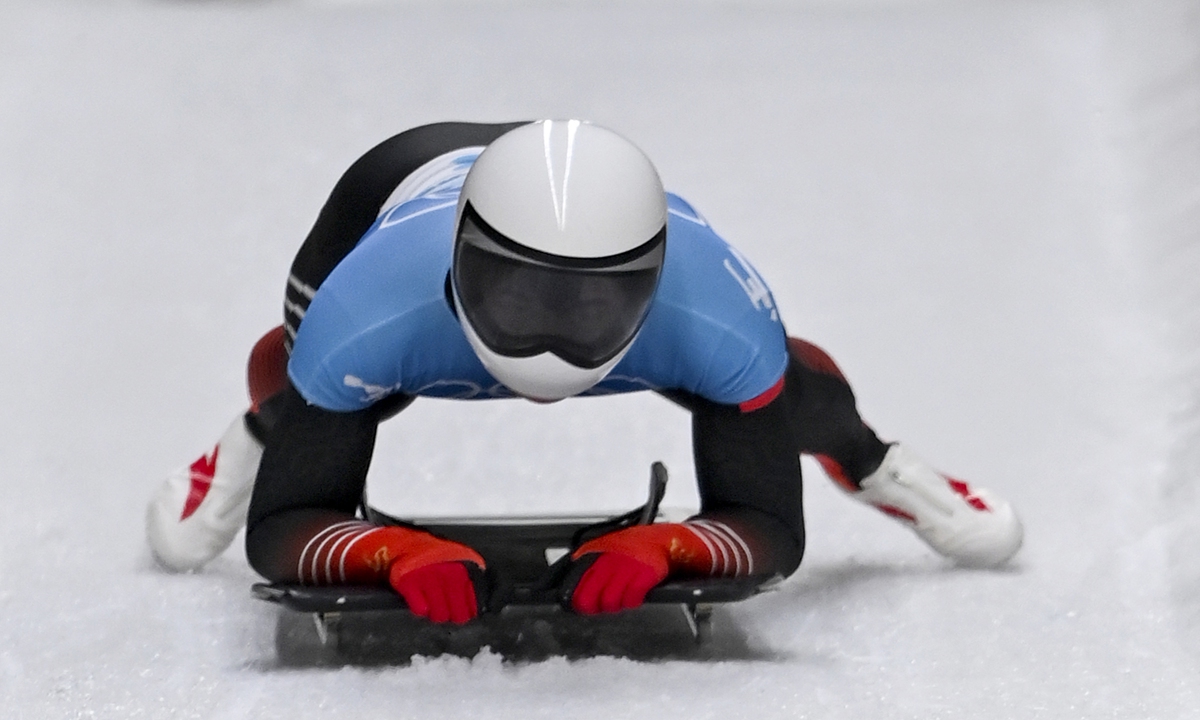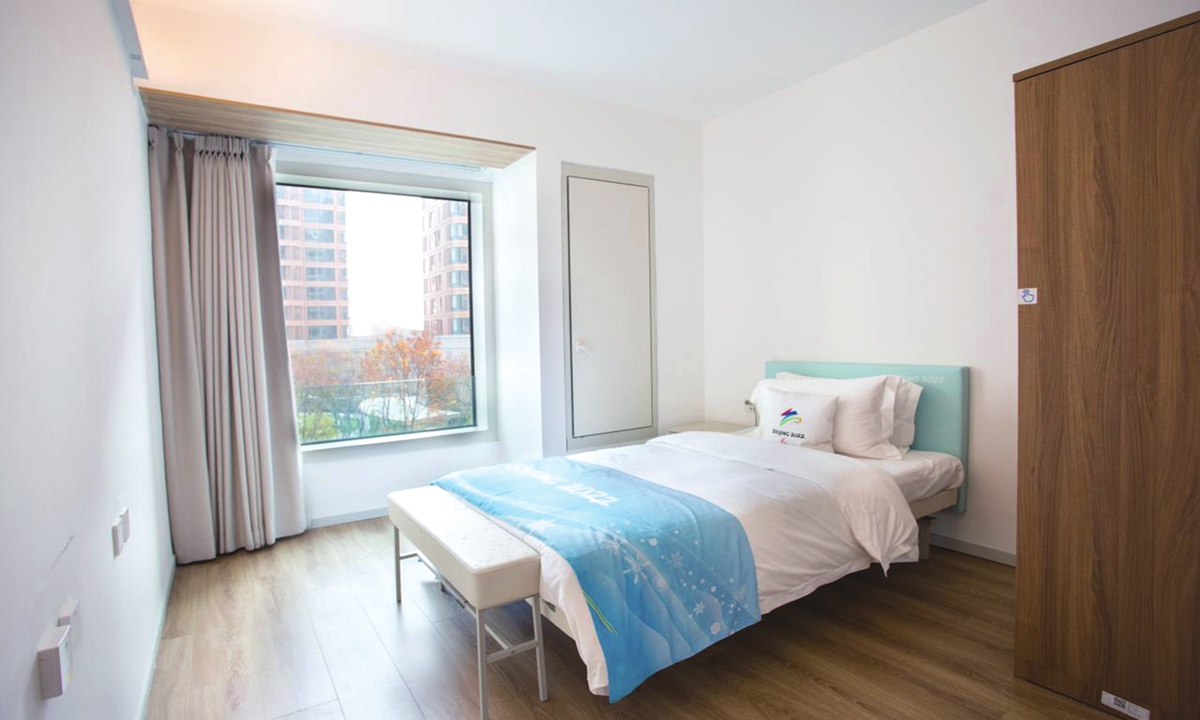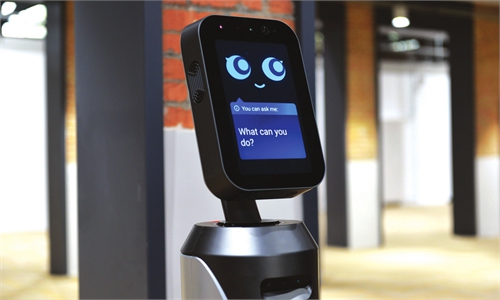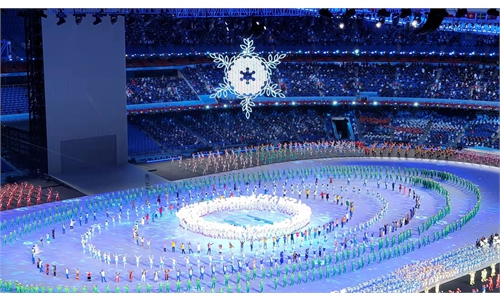New smarter technology gadgets boost Chinese athletes' performance at Beijing Winter Games
Chinese athletes’ performance is boosted by new smart gadgets

Chinese skeleton athlete Yan Wengang approaches the end of a race on Feburary 11.Yan won the first-ever Olympic bronze medal for the country in the sport. Photo: cnsphoto
The Beijing 2022 Winter Olympics is not only a sporting event, but also a science and technology showcase. From the upgrading athletic wear to comfortable bedding, high-tech elements and smart robotics have made their mark on the Beijing Winter Olympic Games.
The "made in China" technologies are not only a powerful demonstration of independent innovation capabilities of the country, but also provides a strong guarantee for a smooth operation of the Beijing 2022 Winter Olympics.
On Friday, Chinese skeleton athlete Yan Wengang won the first-ever Olympic bronze medal for the country in the sliding sport. The country's scientific and research efforts and the use of 3D technology have been the smart technology supporting Yan's win.
The sport requires athletes to begin a 25-meter long running start before lying prone on the vehicle and sliding down the track, and the "explosive speed" on the short run is the key to the success of the competition, as the athletes' run-up will boost the speed of their sled too.
In order to enhance the force, Chinese skeleton athletes' shoes are made by Chinese sportswear brand Anta and designed with 3D printing technology to reduce wind resistance, Anta told the Global Times.
The drag reduction design is able to reduce wind resistance by 10 percent and track friction by 53.5 percent. The shoes are also installed with 3D printed titanium alloy nail to increase force. In addition Nitrogen technology in the bottom of the shoe enhances the low temperature resistance and high re-bounding ability.
This pair of shoes, if compared with foreign top brands, can lift up the athlete's performance by up to 0.054 seconds, an average increase of 0.023 seconds, the brand said.
As the official sportswear provider of the Beijing 2022 Winter Olympics, Anta has used its smart technology to equip 12 national teams in events including short track speed-skating, skeleton and curling.
Among them, the design for athlete's uniforms from Chinese short track speed skating team has reached the global top levels for lightness and ventilation, the company said.
The clothing is made from Dyneema anti-cut material which is 15 times stronger than steel wire and 30 percent lighter than nylon and polyester. Simply put, one can't cut it with scissors.

An intelligent bed made by Keeson Technology photo: Courtesy of Keeson Technology
Robotics and 3D printing
The company has tailored the clothes based on each team member's muscle lines through 3D printing technology, which can maximize the athlete's power during contest. It has also been constantly tested in wind tunnels, and its surface uses a special structure to deflect air to effectively reduce drag force by 10 percent.
Outside the field of play, smart technologies and robotics used in the three Olympic Villages have also gone viral and won praises from a global audience.
While the athletes complained the beds made from cardboard during the 2021 Tokyo Summer Games, Beijing stepped up with adjustable, remote-controlled, zero gravity smart beds. US athlete Summer Britcher showcased the bed in a Tiktok video that garnered over 358,000 views in six days.
The smart bed can be adjusted to different angles to fit the athlete's spine and smart sensors in the mattress can provide massages and other services to the athletes.
Keeson Technology Corporation Limited, an official provider of appliances to the three Olympic and Paralympic Villages in Beijing, Yanqing and Zhangjiakou, told the Global Times on Sunday that they had provided over 6,000 intelligent beds and memory foam mattresses, especially their ZERO G intelligent bed that were praised by athletes from all over the world.
As a world leading intelligent bed maker, Keeson Technology has the world's first and also the largest intelligent bed manufacturing factory, with over 8 million consumers in about 50 foreign countries and regions. As of 2021, the number of Keeson Technology's registered patents reached 700.
Shortly after the opening of the Olympics, the bed manufacturing has seen their orders skyrocket following their debut at the Beijing Winter Olympics.
"In the first week after the opening of the Games, the online purchase rate has grown by 300 percent compared the same time in the previous years. With internet-based promotions, our market awareness at home and abroad has increased to 70 percent from the 10 percent," the company said.
In addition, the venues of different pavilions are equipped with smart robots to provide cleaning and disinfection, guidance, logistics, cooking and translation services, winning acclaim from audiences from all over the world.
New technology has always been one of the biggest highlights of the Beijing Winter Olympics. The smart technologies are the embodiment of made-in-China, Chinese wisdom and Chinese science and technology, Liu Dingding, a Beijing-based independent analyst told the Global Times on Sunday.
For the enterprises, using their own technology to serve the Olympic Games is a good opportunity to gain brand prestige to a global audience, he said.



